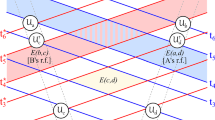Abstract
The Ollivier–Poulin–Zurek definition of objectivity provides a philosophical basis for the environment as witness formulation of decoherence theory and hence for quantum Darwinism. It is shown that no account of the reference of the key terms in this definition can be given that does not render the definition inapplicable within quantum theory. It is argued that this is not the fault of the language used, but of the assumption that the laws of physics are independent of Hilbert-space decomposition. All evidence suggests that this latter assumption is true. If it is, decoherence cannot explain the emergence of classicality.
Similar content being viewed by others
References
Bacciagaluppi G (2007) The role of decoherence in quantum mechanics. Stanford Encyclopedia of Philosophy, http://plato.stanford.edu/entries/qm-decoherence/ (accessed March 16, 2009)
Blume-Kohout R, Zurek WH (2006) Quantum Darwinism: entanglement, branches, and the emergent classicality of redundantly stored quantum information. Phys Rev A 73:062310 arXiv:quant-ph/0505031v2
Bohr N (1928) The quantum postulate and the recent developments of atomic theory. Nature 121:580–590
Bousso R, Susskind L (2011) The multiverse interpretation of quantum mechanics. Preprint arXiv:1105.3796v1 [hep-th]
Brune M, Hagley E, Dreyer J, Maître X, Maali A, Wunderlich C, Raimond JM, Haroche S (1996) Observing the progressive decoherence of the “meter” in a quantum measurement. Phys Rev Lett 77:4887–4890
Chomsky N (1965) Cartesian linguistics. Harper and Row, New York
Everett H III (1957) ‘Relative state’ formulation of quantum mechanics. Rev Mod Phys 29:454–462
Fields C (2010) Quantum Darwinism requires an extra-theoretical assumption of encoding redundancy. Int J Theor Phys 49:2523–2527, arXiv:1003.5136v2 [quant-ph]
Fields C (2011) Classical system boundaries cannot be determined within quantum Darwinism. Phys Essays 24:518–522, arXiv:1008.0283v4 [quant-ph]
Fields C (2012a) If physics is an information science, what is an observer? Information 3:92–123, arXiv:1108.4865v2 [quant-ph]
Fields C (2012b) A model-theoretic interpretation of environment-induced superselection. Int J Gen Syst 41:847–859, arXiv:1202.1019v2 [quant-ph]
Fields C (2012c) Implementation of classical communication in a quantum world. Information 3:809–831, arXiv:1206.4247v3 [quant-ph]
Fields C (2013) Bell’s theorem from Moore’s theorem. Int J Gen Syst 42:376–385, arXiv:1201.3672v6 [quant-ph]
Fuchs C (2010) QBism: the perimeter of quantum Bayesianism. Preprint arXiv:1003.5209v1 [quant-ph]
Griffiths RB (2002) Consistent quantum theory. Cambridge University Press, New York, http://quantum.phys.cmu.edu/CQT/ (accessed August 5, 2011).
Griffiths RB (2007) Types of quantum information. Phys Rev 76:062320, arXiv:0707.3752v2 [quant-ph]
Griffiths RB (2011) A consistent quantum ontology. Preprint arXiv:1105.3932v1 [quant-ph]
Hartle JB (2008) The quasiclassical realms of this quantum universe. Found Phys 41:982–1006, arXiv:0806.3776v5 [quant-ph]
Joos E, Zeh D (1985) The emergence of classical properties through interaction with the environment. Z Phys B Condens Matter 59:223–243
Kiefer C, Queisser F, Starobinsky A (2011) Cosmological constant from decoherence. Class Quantum Gravity 28: 125022, arXiv:1010.5331v2 [astro-ph.CO]
Landsman NP (2007) Between classical and quantum. In: Butterfield J, Earman J (eds) Handbook of the philosophy of science: philosophy of physics. Elsevier, Amsterdam, pp 417–553, arXiv:quant-ph/0506082v2
Marr D (1982) Vision. Freeman, New York
Martineau P (2006) On the decoherence of primordial fluctuations during inflation. Class Quantum Gravity 24:5817–5834, arXiv:astro-ph/0601.134v1
Moore EF (1956) Gedankenexperiments on sequential machines. In: Shannon CW, McCarthy J (eds) Autonoma studies, Princeton University Press, Princeton, pp 129–155
Ollivier H, Poulin D, Zurek WH (2004) Objective properties from subjective quantum states: environment as a witness. Phys Rev Lett 93:220401, arXiv:quant-ph/0307229v2
Ollivier H, Poulin D, Zurek WH (2005) Environment as a witness: selective proliferation of information and emergence of objectivity in a quantum universe. Phys Rev A 72:042113, arXiv:quant-ph/0408125v3
Reoderer JG (2005) Information and its role in nature. Springer, Berlin
Riedel CJ, Zurek WH (2010) Quantum Darwinism in an everyday environment: huge redundancy in scattered photons. Phys Rev Lett 105: 020404, arXiv:1001.3419 [quant-ph]
Schlosshauer M (2004) Decoherence, the measurement problem, and interpretations of quantum theory. Rev Mod Phys 76:1267–1305, arXiv:quant-ph/0312059v4
Schlosshauer M (2007) Decoherence and the quantum to classical transition. Springer, Berlin
Tegmark M (2010) Many worlds in context. In: Saunders S, Barrett J, Kent A, Wallace D (eds) Many Worlds? Everett, quantum theory and reality. Oxford University Press, Oxford, pp 553–581, arXiv:0905.2182v2 [quant-ph]
Wallace D (2008) Philosophy of quantum mechanics. In: Rickles D (ed) The Ashgate companion to contemporary philosophy of physics. Ashgate, Aldershot, pp 16–98, arXiv:0712.0149v1 [quant-ph]
Wallace D (2010) Decoherence and ontology. In: Saunders S, Barrett J, Kent A, Wallace DD (eds) Many Worlds? Everett, quantum theory and reality, Oxford University Press, Oxford, pp 53–72
Wigner EP (1962) Remarks on the mind-body question. In: Good IJ ((eds) The scientist speculates, Basic Books, New York, pp 284–302
Zeh D (1970) On the interpretation of measurement in quantum theory. Found Phys 1:69–76
Zeh D (1973) Toward a quantum theory of observation. Found Phys 3:109–116
Zeh D (2006) Roots and fruits of decoherence. In: Duplantier B, Raimond J-M, Rivasseau V (eds) Quantum decoherence. Birkhäuser, Basel, pp 151–175, arXiv:quant-ph/0512078v2
Zurek WH (1981) Pointer basis of the quantum apparatus: into what mixture does the wave packet collapse? Phys Rev D 24:1516–1525
Zurek WH (1982) Environment-induced superselection rules. Phys Rev D 26:1862–1880
Zurek WH (1998) Decoherence, einselection and the existential interpretation (the rough guide). Philos Trans R Soc A 356:1793–1821
Zurek WH (2003) Decoherence, einselection, and the quantum origins of the classical. Rev Mod Phys 75:715–775, arXiv:quant-ph/0105127v3
Zurek WH (2005) Probabilities from entanglement, born’s rule p k = |ψ k |2 from envariance. Phys Rev A 71: 052105, arXiv:quant-ph/0405161v2
Zurek WH (2007) Relative states and the environment: einselection, envariance, quantum Darwinism, and the existential interpretation. Preprint arXiv:0707.2832v1 [quant-ph]
Zurek WH (2009) Quantum Darwinism. Nat Phys 5:181–188, arXiv:0903.5082v1 [quant-ph]
Zwolak M, Quan HT, Zurek WH (2009) Quantum Darwinism in a hazy environment. Phys Rev Lett 103:110402, arXiv:0904.0418v2 [quant-ph]
Zwolak M, Quan HT, Zurek WH (2010) Quantum Darwinism in non-ideal environments. Phys Rev A 81:062110, arXiv:0911.4307 [quant-ph]
Acknowledgment
I thank Juan Roederer for informative and enjoyable discussions of the issues explored in this paper, and two anonymous referees for raising useful questions about an earlier version.
Author information
Authors and Affiliations
Corresponding author
Rights and permissions
About this article
Cite this article
Fields, C. On the Ollivier–Poulin–Zurek Definition of Objectivity. Axiomathes 24, 137–156 (2014). https://doi.org/10.1007/s10516-013-9218-3
Received:
Accepted:
Published:
Issue Date:
DOI: https://doi.org/10.1007/s10516-013-9218-3




